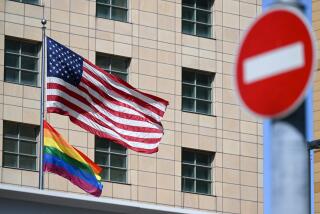Boy Scouts considers lifting ban on gays
Six months after the Boy Scouts of America reaffirmed its long-standing ban on gays, the organization signaled Monday that it might retreat from that prohibition and allow local groups to decide.
The proposed policy shift, which the Scouts’ national board will discuss next week in Irving, Texas, follows a decades-long effort to exclude homosexual boys and adult leaders. It also coincides with growing public support for gay rights and pressure on the Scouts from corporations, some local governments and even members of its board to eliminate the ban.
“The policy change under discussion would allow the religious, civic or educational organizations that oversee and deliver Scouting to determine how to address this issue,” spokesman Deron Smith said in a statement. “The Boy Scouts would not, under any circumstances, dictate a position to units, members or parents.”
The proposed change — which is likely to be opposed by some religious organizations and others — is the result of “a long-standing dialogue within the Scouting family,” Smith said.
“Last year Scouting realized the policy caused some volunteers and chartered organizations ... to act in conflict with their missions, principles or religious beliefs,” he said. “It’s important to note this policy would not require any chartered organization to act in ways inconsistent with that organization’s mission, principles or religious beliefs.”
Although Smith said there was no particular impetus for the proposed change, society’s attitudes are shifting. An NBC News/Wall Street Journal poll conducted in December found that 51% favored or strongly favored same-sex marriage, with 40% opposed. In 2004, the same poll found 30% in favor and 61% against.
In his inaugural address last week, President Obama raised the profile of the gay rights movement, likening it to campaigns for civil rights and women’s suffrage. He announced his support for same-sex marriage in May.
And in November, voters in Maine, Maryland and Washington state approved same-sex marriage measures.
The Scouts’ exclusionary policies have cost it corporate support. Among other public relations crises the Scouts faced last year, computer chip maker Intel and the philanthropic arm of shipping giant UPS both withdrew financial support because of the gay ban.
At least two members of the Scouts’ national board, AT&T; Chief Executive Randall Stephenson and Ernst & Young Chief Executive James Turley, have called for ending the ban or amending the policy to make the group more inclusive.
Their public statements in favor of diversity came weeks after the Scouts forced out an Ohio Cub Scout den leader, Jennifer Tyrrell, in April. Tyrrell, a lesbian, had support from the parents of boys in her pack as well as thousands of others, who petitioned the Scouts to reinstate her.
In July, however, the Scouts announced it would keep the no-gays policy. The decision, experts said, reflected the conservative values of many members, as well as the influence of the Roman Catholic and Mormon churches.
At the time, Scout officials cited broad-based support for the policy, which is essentially “don’t ask, don’t tell.” The U.S. Supreme Court upheld the policy in 2000, but it has long prompted protests. Scouts for Equality’s website says that petitions opposing the ban have more than 1.2 million signatures.
On Monday, gay rights advocates welcomed the prospect of change.
“The Boy Scouts of America have heard from Scouts, corporations and millions of Americans that discriminating against gay Scouts and Scout leaders is wrong,” said Herndon Graddick, president of the Gay and Lesbian Alliance Against Defamation. “Scouting is a valuable institution, and this change will only strengthen its core principles of fairness and respect.”
The proposal to lift the ban is likely to face resistance from some religious groups, which are major sponsors of Scouting’s 2.7 million members. The Church of Jesus Christ of Latter-day Saints is the largest chartering organization, according to the Scouts, with nearly 421,000 boys enrolled in more than 37,000 units.
Rick Barnes, Scout executive of Utah’s Great Salt Lake Council, would not say whether he and other leaders in his area would support a policy shift if the national board made one.
“We’ll wait and see how that shakes out,” he said.
But Tony Perkins, president of the Family Research Council, a conservative Christian group and lobbying organization, declared his opposition and accused the Scouts of bowing to pressure.
“If the board capitulates to the bullying of homosexual activists, the Boy Scouts’ legacy of producing great leaders will become yet another casualty of moral compromise,” Perkins said in a statement.
That wasn’t how Howard Menzer saw it. The Eagle Scout and longtime troop leader had been in the Scouts for 54 years when he walked away in 1999 to protest the ban. On Monday, he could barely contain his joy.
“I can’t even talk, I’m so excited about this,” said Menzer, 75, who lives in San Diego and is president of Scouting for All, a nonprofit advocacy group.
“I have been fighting this fight since 2000 from the outside — and I had been fighting it a lot longer from the inside before that,” he said. “This to me is the culmination of a hell of a battle.”
More to Read
Start your day right
Sign up for Essential California for news, features and recommendations from the L.A. Times and beyond in your inbox six days a week.
You may occasionally receive promotional content from the Los Angeles Times.







